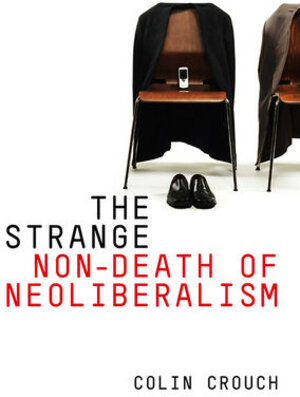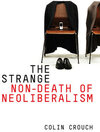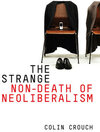
"A highly approachable and illuminating argument in politicaleconomy ... The story is packed with thought-provoking reframings: financial irresponsibility is now a 'collective good'; and 'theidea of a „job“' now seems very weird to me indeed.„
The Guardian
“This highly accessible book makes its case persuasively.„
Times Higher Education
“a valuable book that not only gives a very good overview ofneo-liberalism and its failings, but also points to governmenterrors and serves as a good primer in such things as imperfectinformation in markets.„
Irish Journal of Sociology
“A rich and powerful book. It pushes towards an analysisof neoliberalism not as the set of liberalizing forces that itdepicts itself as being, but rather as a grouping of impulses thathave both hampered government and weakened marketcompetition.„
Crooked Timber
“An excellent contribution to the study of political economythat directly resolves the puzzle it has identified.„
Transfer: European Review of Labour andResearch
“A well-reasoned and tightly argued analysis of our presentpredicament. Although written for the intelligent general reader, rather than subject specialists, his insights constantly provokeand illuminate. Far from being merely a dry dissection ofneoliberal theory, the book also addresses how to make corporationsbehave better.„
LSE Politics Blog
“Takes forward and moves beyond Karl Polanyi's (1957)analysis of state/market relationsto match the changing conditionsof the twenty-first century.„
Journal of Contemporary European Studies
“The most important work on the political economy of moderncapitalism since Keynes, Kalecki and Schonfield.„
Philippe C. Schmitter, European University Institute
“Colin Crouch shows how neoliberalism as embodied in largecorporations brought about the Great Recession of 2007 and yet, ironically, they profited in wealth and power from it - at everyoneelse's expense. A compelling read.„
Michael Mann, University of California, Los Angeles
“An excellent contribution to the debate about neoliberalism. Crouch gives us a tightly reasoned and well balanced critique ofthe neoliberal philosophy that contributed significantly to the2008 financial crisis. And his call for a more frank discussion incivil society of the moral and ethical assumptions behindneoliberalism is a refreshing addition to the traditional call forsimply bringing the state back in to tame market forces."
John L. Campbell, Dartmouth College
The Strange Non-death of Neo-liberalism
von Colin CrouchSeveral factors have brought us to this situation:
* The lobbying power of firms whose donations are of growingimportance to cash-hungry politicians and parties
* The weakening of competitive forces by firms large enough toshape and dominate their markets
* The moral initiative that is grasped by enterprises that devisetheir own agendas of corporate social responsibility
Both democratic politics and the free market are weakened bythese processes, but they are largely inevitable and not alwaysmalign. Hope for the future, therefore, cannot lie in suppressingthem in order to attain either an economy of pure markets or asocialist society. Rather it lies in dragging the giant corporationfully into political controversy.







